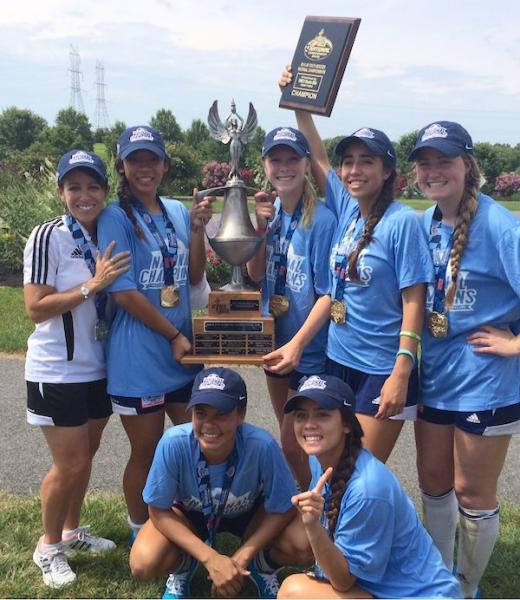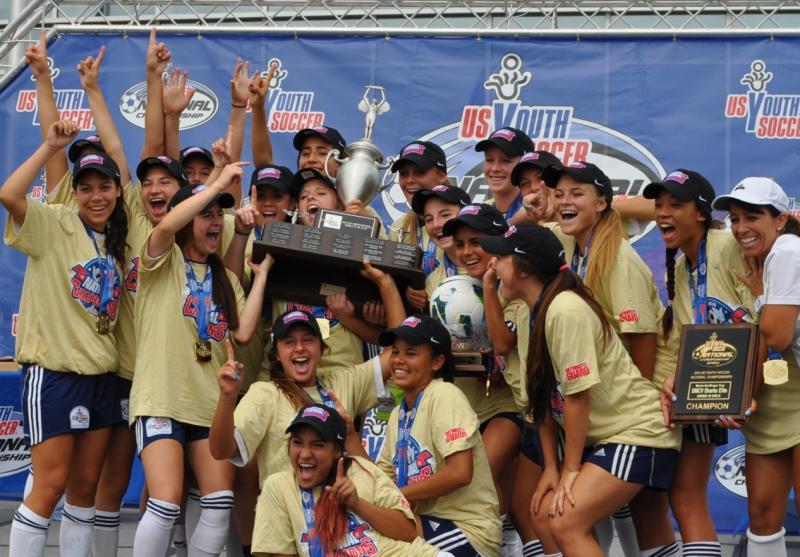SoccerToday’s Women In Soccer Series
Felicia Kappes is well known in the youth and collegiate soccer world for inspiring passion and bringing out the best in her players. Head Coach Kappes’ Del Mar Carmel Valley Sharks GU17 team is a great example of her work. Her players are well known for their talent, dedication and passion for the world’s most beautiful game. Now, the team is also known as US Youth Soccer back-to-back National Champions (2013, 2014). Coached for years by Kappes, Cal South’s Youth Competitive Coach of the Year for 2013, the 1996/97 team reached the pinnacle of youth soccer by winning the championship two years in a row.
Kappes holds a B License from the US Soccer Federation. A former collegiate player who was twice named a Division III All-American while at UC San Diego, Kappes’ team won the National Championship in 1989. Kappes also holds a Master of Science in Sports Management from the University of Massachusetts. Now a youth soccer coach, Kappes has coached at UCSD, SDSU and UMASS. While she was assistant coach to Jim Rudy, UMASS reached the quarter finals of the NCAA Division I tournament.
Diane Scavuzzo: When did you first start playing soccer?
Felicia Kappes: I started playing soccer when my mother moved us to Southern California from New York City when I was 8 years old. She wanted us in a healthier environment than the rough Bronx, New York, neighborhood. She felt my brothers were growing up too quickly on the streets.
As soon as we moved here, my mother enrolled us all in recreational sports and she volunteered for everything. Soccer was my main sport and my mother was my very first coach. I instantly fell in love with this great sport. From early on this sport taught me so many great life lessons.
Diane Scavuzzo: Where did you play youth soccer?
Felicia Kappes: There were not many Youth Soccer Club opportunities when I was growing up playing. There were only 2 to 3 Clubs in all of San Diego. I had to play up by two years for several seasons due to the lack of opportunities, and I pursued a degree in Communications and Political Science at UCSD and played 4 years of College Soccer there.
Diane Scavuzzo: Where do you coach now and what teams?
Felicia Kappes: I coach a GU18 Elite team at the DMCV Sharks part time (even though this team feels more like full time).
Diane Scavuzzo: Do you think women coaches are paid the same as men?
Felicia Kappes: I think it has been documented that in general in all fields women are not paid the same as men.
Diane Scavuzzo: Where have you coached in the past – I know you have earned many awards … can you tell us?
Felicia Kappes: Of course – here you go! I coached college soccer at UCSD, UMASS Amherst and SDSU. In youth competitive soccer, I have coached at Carlsbad Lightning, CV Manchester, and DMCV Sharks Soccer Club.
I have been very fortunate and have been awarded two-time US Youth National Champion 2013, 2014; 2013, 2014 National League Champions, Cal Couth State Champions 2012, 2013; Region IV Finalist, FWRL Champion, U15 US Manchester Cup Champion (represented US at the Gothia Cup); 2013 Cal South Olders Competitive Coach of the Year.
Diane Scavuzzo: Why do you coach?
Felicia Kappes: I have a passion and love for this game and strongly believe this sport provides wonderful life lessons for our youth players.
My passion for the game stems from my childhood and the fact this sport gave me an outlet when things were difficult. I had no confidence off the field but felt great on the field. I know this sport taught me valuable life skills that helped me to succeed. In fact, soccer has helped me in every aspect of my life (academically, personally and professionally).
Soccer has provided me wonderful career opportunities. I coach because I love the game and even more importantly, coaching provides a platform for me to give back to the sport that gave me so much.
Every time I step on the field with my players, I try to come from the perspective that sport mirrors life, and I ask myself how can we learn from this game whether it be at a practice, a big competition, or simply traveling together.
I may be a little too philosophical at times, but I approach coaching from the perspective that I am providing and developing life skills in my players that they will be able to rely on during difficult times as well as when times are going well. All those wonderful clichés were true for me … learning time management skills, problem solving, goal setting and how to handle both failure and success. Soccer also teaches how to work in a group setting, helps develop a strong work ethic and teaches the importance of confidence and mental toughness.
Diane Scavuzzo: Is there a coach who influenced you significantly?
Felicia Kappes: Three coaches specifically influenced me. My mom being my first coach influenced me, not for her knowledge of the game (she was just learning about the fundamentals about the game) but by being my first strong female role model. My mom was such a strong independent woman who constantly told me anything was possible through her actions. I respected her willingness to be fearless and ability to overcome adversity.
Now that I am a mother of four I really appreciate how much she accomplished and sacrificed as a hard working single mom.
The second coach who greatly influenced me was my college coach, Brian McManus. McManus helped me develop my passion for this game and encouraged me to pursue this as a career. He is still one of my mentors today who I call when I need advice for soccer or otherwise.
And the third coach who influenced me was Lesle Gallimore. Gallimore helped me believe I could really be successful in this field as a woman.
Gallimore is so passionate and coaches for all the right reasons. She teaches her players so many life lessons, constantly helps to promote women in sports (still doing that today) and of course is extremely successful.
She offered me one of my greatest development opportunities. I was a “coach in training” on Gallimore’s ODP Regional IV staff when I was first starting off and that internship really inspired me.
It’s ironic Gallimore started the SDSU Women’s soccer program and I came in to help build that program after she left for UW. To this day I feel so fortunate to call her my mentor and friend.
Diane Scavuzzo: What are the challenges being a woman in the soccer world?
Felicia Kappes: There are several challenges; first one is balancing being a mother and a successful coach and administrator. Very often woman have the primary role at home of caring for their children, and balancing that can be difficult if you don’t have the right support.
Secondly, having a passionate and nurturing style of coaching has to be viewed as a positive thing.
Early on I didn’t have a thick enough skin and cared too much what people thought, especially male coaches. I felt I had to always prove myself and coaching abilities since I was in a male-dominated field.
Sometimes this made me feel vulnerable. Now, I am confident in my abilities and how I do things — but, I have a lot of experience now. I think supporting young female soccer coaches early on will keep them in this field.
Finally, I still think we still need to see woman given more opportunities.
Diane Scavuzzo: Who do you think is the best woman coach in the world?
Felicia Kappes: Truly for me, Lesle Gallimore because not only is she an incredible coach but an incredible role model. Obviously we have some wonderful women coaches on the US National Staff. I really love April Kater too. I met her when I was at Umass and have followed her career as a friend. She is also passionate about developing young players. I
’ve also been very fortunate to work with a strong successful woman in Shannon MacMillan. She is doing a fantastic job developing our DMCV Sharks Soccer Club into a powerful force in Southern California as well as on national level. The DMCV Sharks have a large recreational and competitive program and MacMillan is one of the few women leading a youth organization in America.
Diane Scavuzzo: What would make more women coach? Why do you think so few women do?
Felicia Kappes: I’m not sure but more role models, more opportunities, more mentoring would help. I love that we are seeing Sport Management as a field to pursue and I know more woman are going into this field.
Diane Scavuzzo: What are specific virtues or benefits of being a woman coach?
Felicia Kappes: I truly feel we offer a unique coaching style that young women can relate to. Female coaches often have more nurturing characteristics and better communication skills. I am passionate about being a positive role model for the next generation of women in soccer.
No matter how successful, a male coach can’t offer this perspective and example of leadership. Boys have their male coaches to look up to and girls deserve this as well. I believe it is very important that female players have a qualified female coach at some point during their development.
Diane Scavuzzo: Do you think there is an old boy’s network in youth soccer?
Felicia Kappes: Absolutely; men network and help promote other men better than woman do.
While the world seems to accept male coaches easily and even grant more respect sometimes to those who have accents, women have to have an extensive resume behind them to prove their abilities. Male coaches don’t seem to suffer the same scrutiny as female ones.
I believe women in this field have a responsibility to mentor other woman and network. We all need to help promote more opportunities through internships, employment opportunities and education.
Diane Scavuzzo: Do you watch women’s soccer? Do you tell your players to watch?
Felicia Kappes: Absolutely, I want them to have as many role models as possible.








